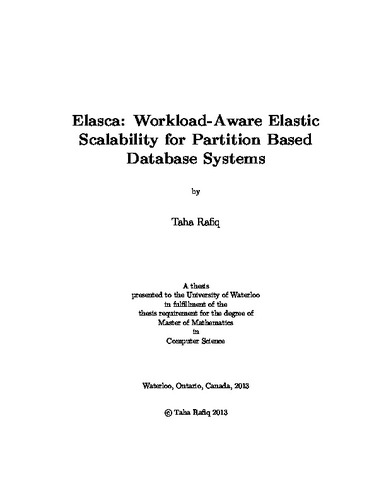| dc.description.abstract | Providing the ability to increase or decrease allocated resources on demand as the transactional load varies is essential for database management systems (DBMS) deployed on today's computing platforms, such as the cloud. The need to maintain consistency of the database, at very large scales, while providing high performance and reliability makes elasticity particularly challenging. In this thesis, we exploit data partitioning as a way to provide elastic DBMS scalability. We assert that the flexibility provided by a partitioned, shared-nothing parallel DBMS can be used to implement elasticity. Our idea is to start with a small number of servers that manage all the partitions, and to elastically scale out by dynamically adding new servers and redistributing database partitions among these servers as the load varies. Implementing this approach requires (a) efficient mechanisms for addition/removal of servers and migration of partitions, and (b) policies to efficiently determine the optimal placement of partitions on the given servers as well as plans for partition migration.
This thesis presents Elasca, a system that implements both these features in an existing shared-nothing DBMS (namely VoltDB) to provide automatic elastic scalability. Elasca consists of a mechanism for enabling elastic scalability, and a workload-aware optimizer for determining optimal partition placement and migration plans. Our optimizer minimizes computing resources required and balances load effectively without compromising system performance, even in the presence of variations in intensity and skew of the load. The results of our experiments show that Elasca is able to achieve performance close to a fully provisioned system while saving 35% resources on average. Furthermore, Elasca's workload-aware optimizer performs up to 79% less data movement than a greedy approach to resource minimization, and also balance load much more effectively. | en |

